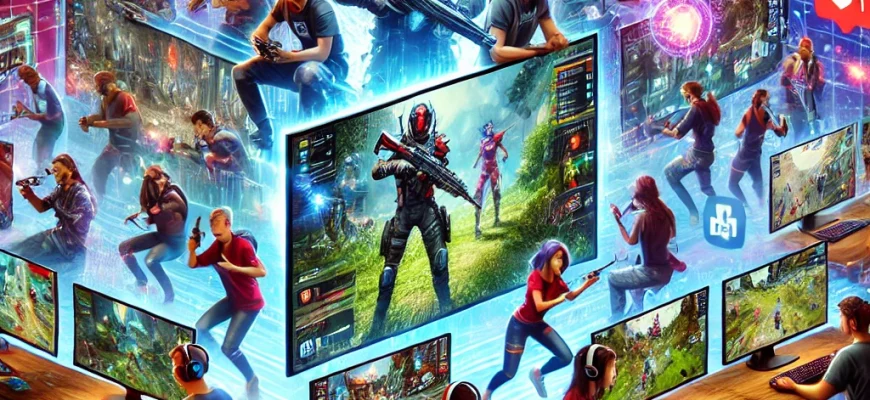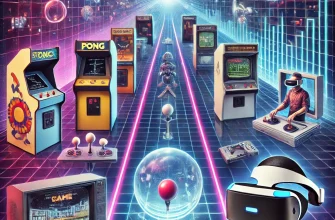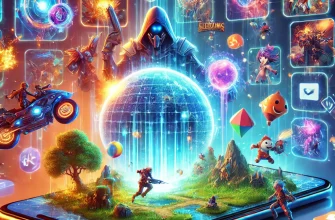The emergence of digital games accessible via the internet has significantly altered the dynamics of human social engagement, presenting a myriad of beneficial and detrimental consequences. It is imperative to comprehend the influence these electronic landscapes exert on social exchanges in the tangible world.
- The Progression of Internet-Based Gaming
Initially, gaming on the internet began as rudimentary, text-driven quests, but it has since progressed to become sophisticated, collective adventures. Contemporary games typically offer elaborate stories, intricate gameplay, and the opportunity to forge connections with individuals across the globe. Such advancements have profoundly affected the way players interact socially, extending beyond the confines of the digital realm.
Notable Advancements:
- Massive Multi-Player Online Games (MMOs): Titles such as World of Warcraft and Final Fantasy XIV enable countless participants to converge within extensive digital universes.
- Interactive Gaming Services: Platforms like Steam and Xbox Live introduce social functionalities, including lists of acquaintances, text communication, and vocal interaction.
- Portable Gaming: Titles like Clash of Clans and PUBG Mobile have opened doors to a wider audience, enhancing the accessibility of online gaming.
- Favorable Effects on Social Engagement
Enhancing Community Ties
- Digital games are instrumental in cultivating communities. Gamers regularly align with groups, squads, or coalitions, cultivating connections through mutual interests and aspirations.
- These assemblies offer a sense of inclusion and reinforcement, particularly beneficial to those finding direct social interaction challenging.
Cultivating Social Competencies
- Multi-player games necessitate dialogue, collaboration, and tactical thinking, contributing to improved social aptitudes.
- Within their gaming circles, players frequently cultivate leadership qualities and the capacity to navigate conflicts.
Fostering Cross-Cultural Interactions
- Digital gaming brings together individuals from varied backgrounds, fostering cultural interchange and comprehension.
- Gamers gain insights into different customs and viewpoints, expanding their perspective.
Supportive Networks
- Gaming circles often act as pillars of support where personal hurdles can be shared and encouragement obtained.
- These networks are notably advantageous for those grappling with mental health concerns or social detachment.
- Adverse Effects on Social Engagement
The Dangers of Social Withdrawal
- An overindulgence in gaming may cause individuals to favor virtual exchanges over actual social ties.
- Such seclusion can provoke feelings of solitude and despondency, particularly when gaming supplants direct human contact.
Digital Harassment and Destructive Conduct
- Occasionally, gaming environs can propagate hostile behaviors, such as intimidation, digital harassment, and ostracism.
- These adverse exchanges can impinge on mental well-being and dissuade involvement in gaming groups.
Habit Formation and Reliance
- The addictive nature of digital gaming can lead to neglect of duties, diminished academic or professional performance, and tense personal connections.
- This dependency may further intensify social seclusion and degrade the caliber of actual social engagements.
Communicative Missteps
- Communication through text and voice in games may sometimes result in misunderstandings and disputes, given the absence of physical cues.
- These communicative errors can burden relationships within gaming communities and affect real-world interactions.
- Harmonizing Digital and Personal Social Engagements
It is essential to strike an equitable balance between gaming in the digital space and personal socializing to safeguard overall well-being. Here are a few tactics to foster a beneficial social existence:
Establishing Limits
- Define explicit gaming intervals to avert encroachment upon daily tasks and personal relationships.
- Motivate gamers to intersperse their play with breaks and partake in activities unconnected to gaming.
Advocating Wholesome Gaming Practices
- Opt for games that highlight cooperative play and positive social exchanges.
- Engage in gaming communities that promote courteous conduct and disapprove of hostile behavior.
Promoting Direct Social Engagement
Facilitate In-Person Connections Aim to harmonize the time spent in online games with direct interactions, such as being with relatives or engaging in community activities. Motivate players to convert virtual friendships into real-world connections, enhancing the depth of those relationships when circumstances allow.
Professional Assistance In instances where gaming interferes excessively with daily life or becomes compulsive, it’s crucial to seek guidance from professionals or peer support circles that have a focus on gaming-related challenges. Raise awareness about the indicators of excessive gaming and underscore the significance of emotional well-being.
The Evolution of Social Dynamics in Digital Gaming
The trajectory of digital gaming suggests significant potential changes in the way we socialize. Technological leaps in virtual reality (VR) and augmented reality (AR) will undoubtedly influence player interactions.
Virtual Reality (VR) VR crafts all-encompassing realms that allow gamers to engage in a way that mirrors in-person exchanges. These realms can amplify the sense of being together, lending a more genuine feel to online engagements.
Augmented Reality (AR) AR experiences, exemplified by games such as Pokémon GO, integrate virtual features within our physical environment, prompting users to venture out and connect with others face to face. AR holds promise for fusing digital and direct social engagement.
Artificial Intelligence (AI) AI has the capacity to enhance social exchanges within games by introducing NPCs that are both lifelike and interactive. AI-administered tools for managing community conduct can play a role in identifying and curbing negative behaviors, thus nurturing healthier gaming environments.
Final Thoughts
The influence of digital gaming on social interaction is complex, with a spectrum of both beneficial and adverse implications. Online gaming can cultivate communal bonds, refine interpersonal abilities, and bridge cultural divides. However, it also carries the risk of social withdrawal, addictive behaviors, and exposure to harmful interactions. By advocating for responsible gaming practices, establishing limits, and promoting a balance of online and offline interactions, gamers can leverage the social advantages of digital gaming while preserving robust connections in the physical world. As technological innovations advance, the opportunities for enriched social experiences within gaming are set to expand, positioning it as a pivotal component of contemporary social interaction.






